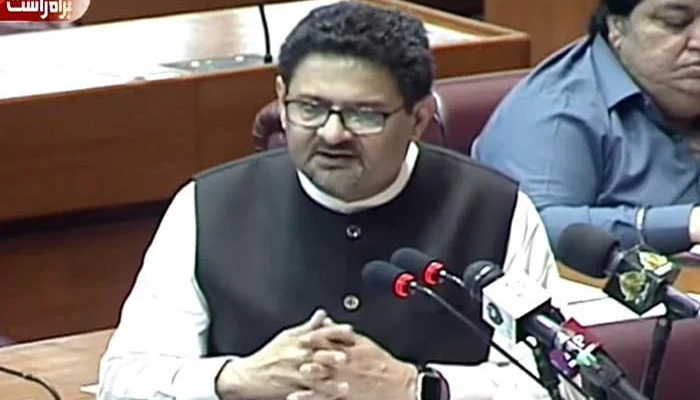Budget 2022-23: We have to pay the price to save Pakistan from bankruptcy, Miftah Ismail says
The government has agreed to the IMF demands in order to revive the $6 billion loan programme stalled since months
ISLAMABAD: Finance Minister Miftah Ismail on Friday said that the country has been saved from bankruptcy and urged the “super rich” of the country to share the burden of taxes.
While delivering his budget 2022-23 winding up speech in the National Assembly after the country reached an accord with the International Monetary Fund (IMF) on budgetary and fiscal measures, the minister announced that the government has imposed a 10% tax on large-scale industries.
The Pakistan Stock Exchange (PSX) crashed after the announcement and lost over 2,000 points during intraday trade.
The IMF had confirmed that discussions with the Pakistani authorities on policies to strengthen macroeconomic stability in the coming year continue, and important progress has been made over the FY23 budget.
According to reports, the government has agreed to the IMF demands in order to revive the $6 billion loan programme stalled since months.
Speaking on the floor of the National Assembly, where only 40 members were present, the finance minister said they have included suggestions of the parliamentarians in the budget for the next fiscal year.
Defending the imposition of super tax on the large scale industries, Miftah Ismail said the companies owned by him will give Rs200 million more tax this year. "We have to pay a price to save the country from going bankrupt."
Criticising the PTI government for "damaging" the economy, the minister said that the fiscal year 2021-22 would be remembered as the "worst year" as the country deviated from all its set targets, accumulating huge deficits up to Rs5310 billion, which is around 9.85% of the GDP.
He questioned how Imran Khan and his team talked about sovereignty when they had taken huge debts during their tenure, taking the country to the brink of default.
However, by taking several decisions, the incumbent government has "saved the country from bankruptcy", he said. “This country is not going towards default, it is going towards progress now,” he remarked.
He said that many budgetary measures were taken to tax the rich and provide relief to the poor.
“The budget is farmer-friendly as many initiatives have been taken to promote agriculture sector to make the country self-sufficient in edible oil, wheat and other crop production.”
Rs40,000 fixed income, sales tax on small gold shops
Moving on to bullion trading, Miftah said that there are over 30,000 gold shops, however, only 22 are registered and their average sales are worth Rs4,000 per day as per the official records.
“These market owners show their sales at Rs4,000 but we believe the average sales amount to approximately Rs100 million,” he said, announcing that a fixed income and sales tax worth Rs40,000 has been imposed on the shops that cover an area of less than 300 square feet so that all gold shops come into the tax radar.
Meanwhile, 17% sales tax has been reduced to 3% for shops covering an area of more than 300 square feet (and fall under tier-1) as such higher tax can never be received from jewellery markets.
Moreover, the withholding tax of 4% has been brought down to 1% for local consumers who sell gold in the markets.
The finance minister said that these taxes imposed on the gold sector are mostly in line with the recommendations of gold shop owners.
Scheme for restaurants, retailers, car dealers
Miftah further added that a “special” scheme will be soon introduced for people who are involved in the real estate business, for builders — who sell the property after its construction — car dealers, and restaurant owners under which fixed income tax will be imposed on them.
“We want to tax their income and not their expenditures which is why the government has decided to impose fixed taxes on these businesses,” he clarified, maintaining that this would not add to rising inflation and only increase revenue.
Increase in income tax for elites
The finance minister said that to curtail the previous four record budget deficits during PTI’s tenure, taxes will be collected from the rich. “The revenue from the rich will help the government achieve its target of budget surplus — which has been committed to the IMF,” he added.
Moreover, to decrease the country’s reliance on other countries for funds, Miftah announced a list of taxes that would be collected from the elite class and large-scale industries. The following is the list of taxes to be imposed:
- 1% additional super tax on individuals or companies earning more than Rs150 million
- 2% additional super tax on individuals or companies earning more than Rs200 million
- 3% additional super tax on individuals or companies earning more than Rs250 million
- 4% additional super tax on individuals or companies earning more than Rs300 million
“These additional taxes will be only be imposed for a year (fiscal year 2022-23),” he clarified.
10% super tax imposed on 13 sectors
Miftah shared the government had identified 13 sectors that had earned significant profits this year. "We have decided that companies that have an income of more than Rs300 million will be subject to a super-tax of 10% for a year," he announced. This covers the following sectors:
- Cement
- Steel
- Banking
- Airlines
- Textile
- Automobile assembling
- Sugar mills
- Beverages
- Oil and gas
- Fertiliser
- Cigarettes
- Chemicals
- LNG terminals
Meanwhile, 4% super tax will be applicable to all other sectors.
Miftah, later in a tweet, also clarified that the super tax of 4% will be applicable to all sectors. But for the specified 13 sectors, another 6% will be added for a total of 10%. So, their tax rates will go from 29% to 39%.
“This is a one-time tax needed to curtail the previous four record budget deficits,” he said.
Moving on to details of other taxes, he said there were around 900,000 retail shops in Pakistan and the government wanted to bring 250,000 to 300,000 of these shops into the tax net.
For this purpose, he said, a new scheme has been introduced under which the income and sales taxes these shops were to pay has been "fixed with their electricity bills". He added that under this initiative, small shops would have to pay a fixed tax of Rs3,000 monthly and big retailers Rs10,000.
Tax concessions
Moving towards some other concessions which have been decided after considering the recommendations, the finance minister announced the following:
- Condition of withholding tax on IT sector companies withdrawn
- Companies with sales less than Rs800 million exempted from withholding tax, statement submission
- Tax on venture capitalist funds invested in IT sector removed
- Minimum tax on oil marketing companies which was 0.75% reduced to 0.5%
- Commission on outgoing indenters at the time of receipt slashed to 1% from 5%
- Provision of 50% reduction in capital gains tax for those who had been allotted plots while in service restored
- Families of martyred and war-wounded individuals exempted from tax on income from plots
- Sales tax on leather and surgical instruments industries removed
Overseas Pakistanis who had a NICOP would be included in the list of active taxpayers so they don't have to pay additional taxes on property purchases.
Tax collection target increased
Miftah also told the house that the tax target, which was initially set at Rs7.004 trillion had been increased to Rs7.47 trillion. At the same time, he added, the target of non-tax revenue that was set at Rs2 trillion had been revised down to Rs1.94 trillion.
He announced that the government will give Rs4.37 trillion to the provinces.
"After all these expenses, the federal government's deficit would stand at Rs4.55 trillion and total deficit at Rs3.78 trillion," the finance minister added.
He recalled that when the erstwhile Fata was merged with Khyber Pakhtunkhwa, the tribal areas had been given an exemption from tax "of every kind" until 2023.
Miftah said the government intended to introduce a bill to exempt the residents of these areas from paying income tax.
However, he added, companies and industries operating in these areas would be brought into the tax net.
-
Bitwise Crypto Industry innovators ETF: What investors should do in 2026?
-
Nintendo shares slide again as momentum fears grow
-
Gold, silver prices fallen sharply; What’s driving the drop?
-
Gold’s record climb: Experts question if its safety is ‘overstated’
-
Dubai unveils plans to construct street built with real gold
-
Netflix slams Paramount’s bid: 'Doesn't pass sniff test’ as Warner battle escalates
-
Ubisoft: Shares plunge amid restructuring plan and wave of games cancellations
-
Netflix revises Warner Bros. deal to $83 billion: All-cash offer












